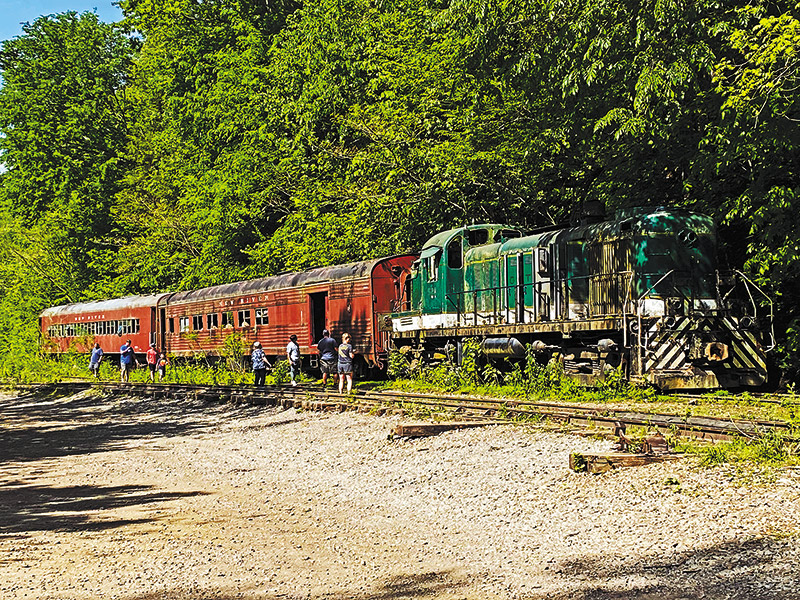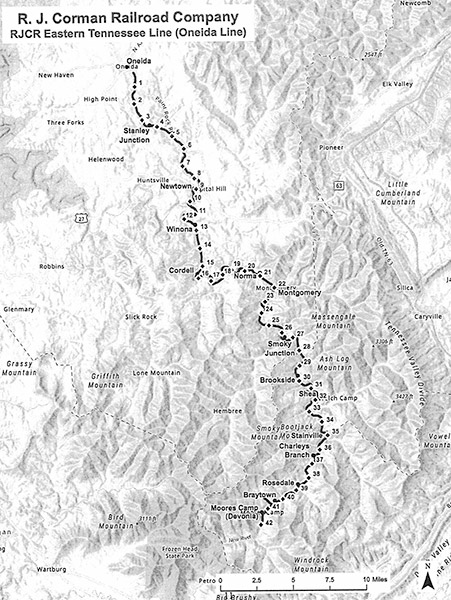Pushing to get back on the right track
Can historic rail line be saved? Anderson County Mayor Frank working to stop abandonment, pave the way for tourist trains
A scenic and historic railroad line that runs along New River from Fork Mountain in remote western Anderson County to Oneida might soon be scrapped and turned into a hike-and-bike trail – or rescued and restored to carry tourist excursion trains.
Those are the choices now facing the former Tennessee Railroad, a 42-mile spur off the Cincinnati-Southern mainline in Oneida (operated by Norfolk Southern) as the spur faces abandonment by its current owner, the R.J. Corman Railroad of Nicholasville, Kentucky.
Anderson County Mayor Terry Frank is helping lead an effort to save the line, which was started in the late 19th century to haul timber and coal out of rural Anderson County.
Owned by Norfolk Southern Corp. (formerly The Southern Railway) from 1973 until Knoxville-based National Coal Corp. bought it in 2006 for $2 million, the line was begun in 1889 and extended to its current terminus at a now-abandoned coal preparation plant at Devonia in 1912.
When National Coal was on the verge of bankruptcy in 2010, it sold the line to R.J. Corman for $3 million, and it was used to haul coal out of the Fork Mountain area from a deep mine and a surface mine until those operations shut down in 2013. Since then, the line has not been used, and has fallen into disrepair. Part of the line from Huntsville in Scott County to Indian Fork in Anderson County did have a short life as a tourist excursion route from 2008 to 2010 when Scotty Phillips, owner of the New River General Store at Devonia, and a partner started the New River Scenic Railway.
They ran the train – consisting of a vintage 1951 Alco RS3 diesel locomotive and two passenger cars – until shortly after R.J. Corman bought the rail line from National Coal and proceeded to terminate the excursion operation’s rights to use the tracks. The former New River Scenic Railway engine and two rail cars – which Phillips brought here from Arizona -- have sat abandoned on a siding behind the Devonia coal-prep plant since 2010, and all three units have been heavily vandalized.
They still draw a lot of visitors who make the trek by mostly four-wheel-drive vehicles by first negotiating Tennessee Route 116’s infamous switchback curves leading in from either Petros to the west or Briceville to the east.
During a recent conversation with The Courier News at the country store Phillips has operated since taking it over from his grandfather in 1982, he said he would like to see another tourist train come to the New River on the rail line, which passes just behind his store on the banks of the river.
“But I won’t be the one running it,” he said of a possible new version of the New River Scenic Railway. “We don’t have the money it would take to get back into that business.”
He said it would cost “lots of money” to rehabilitate the engine and passenger cars on the siding in Devonia, and there are estimates that it would cost at least $600,000 to rehab the rail line itself from Oneida to Devonia, as it has been abandoned and not maintained for the past seven years. There is even a large landslide near the Oneida end of the line that would have to be cleared.
R.J. Corman filed a notice with the U.S. Surface Transportation Board on March 9 of intent to abandon the line, which also runs partly through Campbell County. That followed earlier notices that the company intended to abandon the line, which drew a resolution from the Anderson County Board of Commissioners on Aug. 19, 2019, objecting to the move.
The commissioners approved “A Resolution Authorizing the County Mayor to Enter into Discussions with the R.J. Corman Group, LLC.” about the “possible tourism use of the Tennessee Oneida line.”
On March 19, 2020, the Arkansas-Oklahoma Railroad Co. filed with the Surface Transportation Board a “notice of intent to file an offer of financial assistance” to purchase the line from R.J. Corman, and subsequently was given a price of $2.75 million.
But Arkansas-Oklahoma Railroad missed a filing deadline in April to make good on its offer, blaming the coronavirus shutdowns and failure of R.J. Corman to provide details about the line that the buyers could use to determine its value.
Subsequently, the STB authorized the use of the line as a trail under control of the Cumberland Trail Conference once R.J. Corman abandons it.
But Arkansas-Oklahoma last week won a stay of that order and an extension of its time period to file an offer for the rail line until June 9, or to file for another extension no later than today (June 3).
“We are hoping that Arkansas-Oklahoma Railroad will come up with an offer, and they have told us that they have a tourist operation that wants to use the line for excursions,” Frank said last week.
She also noted that there are still significant coal reserves left in the areas of Anderson County that are served by the rail line, controlled by National Coal, a subsidiary of a company owned by West Virginia Gov. Jim Justice.
Frank said that the North East Tennessee Railroad Authority, made up of the Scott, Anderson and Campbell county governments, also is advocating for a sale of the line to the Arkansas-Oklahoma group. She and the mayors of Scott and Campbell counties are on the board of that authority, created by the state Legislature in 2010 to help the three counties preserve their existing railroad lines for future economic development purposes.
“Once a rail line is abandoned and the tracks are pulled up, it’s nearly impossible to ever get it back,” Frank said.
The next few days could determine the fate of this piece of East Tennessee history, which has been around more than 130 years, Frank said.




